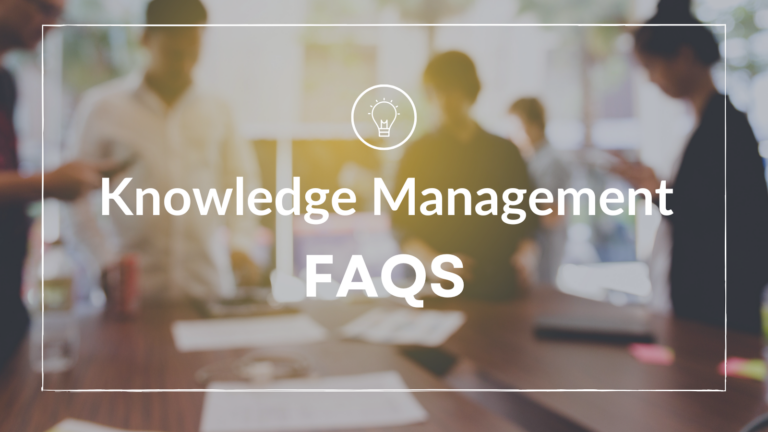Understanding knowledge management can be critically important for an organization’s success. The concept can be complex; it involves coordinated, systematic ways for creating, managing, and using an organization’s knowledge. This Knowledge Management FAQ covers the questions we most often hear from new clients, plus answers from the FireOak team.

Discover our Knowledge Management FAQs:
- What is Knowledge Management (KM)?
- What are some symptoms of organizational knowledge management challenges?
- What’s the role of security in knowledge management?
- Why is Knowledge Management Important?
- What’s the best knowledge management platform?
- How do we get started with improving our organization’s approach to knowledge management?
What is Knowledge Management (KM)?
We define knowledge management as the ways in which an organization creates, captures, secures, describes, shares, and re-uses knowledge and information. It’s how organizations manage their collective information, data, and knowledge.
People are at the core of knowledge management efforts: KM is about connecting people to the information and knowledge they need to be successful, while also ensuring that knowledge assets are findable, discoverable, accessible, and re-usable. All of this requires an intentional approach, good security measures to protect knowledge assets, and proper information and data governance.
Successful organizational approaches to knowledge management impact people, processes, technology, organizational culture, and governance.
Knowledge management: all of the ways in which an organization creates, captures, secures, describes, shares, and re-uses their information & knowledge.
- FireOak Strategies
Read related posts:
What are some symptoms of organizational knowledge management challenges?
Knowledge management challenges can manifest themselves in many ways, but a few common symptoms include:
- Staff feel like they’re spending too much time hunting for information or can’t easily find what they’re looking for.
- Lots of wasted time and resources when employees reinvent the wheel or duplicate effort across silos.
- Loss of valuable knowledge when key staff members leave the organization.
- Files, data, reports, and other knowledge assets are leaking out of the organization.
- It takes a tremendous amount of time and effort to get new staff members fully onboarded and up to speed with their new roles and responsibilities.
Fortunately, all of these pain points can be addressed through good knowledge management practices!
What's the role of security in knowledge management?
We see security as a critical aspect of managing organizational knowledge. A good information security program should be designed around the three core principles of confidentiality, integrity, and availability — all of which align with knowledge management.
An organization’s security program should be designed to ensure that organizational knowledge, information, and data are accessible, usable, findable, and discoverable by the people who need it, when they need it, and how they need to access it. Good security practices should be designed to protect and safeguard organizational knowledge, rather than serving as a barrier for knowledge sharing.
Why is Knowledge Management Important?
Effective Knowledge Management practices can lead to a wide range of benefits including:
- Less wasted time; more efficient, effective processes
- Faster onboarding and improved time to competency for new staff
- Shorter development cycles, increased innovation, faster time to market
- Happier staff
Each organization’s knowledge management program should be designed to accomplish their specified goals and objectives.
What's the best knowledge management platform?
In most cases, we’re platform agnostic and think that the best knowledge management system is one that’s already being used within your organization. Information and knowledge management should be an integrated part of everyday processes, workflows, and tasks, not a siloed set of activities.
As a result, we’re not fans of standalone knowledge management systems. (Plus, most organizations already have too many platforms — a knowledge management pain point in itself!)
In any case, there isn’t a one-size-fits-all solution or a single best knowledge management system. Technology should enable good knowledge management practices, but platforms alone won’t transform an organization — they’re just a starting point.
How do we get started with improving our organization's approach to knowledge management?
We recommend beginning with a current state discovery and assessment process to fully assess what’s working and what’s not within an organization’s knowledge management environment — everything related to how data, information, and knowledge are captured, secured, stored, shared, and re-used. After there’s a shared understanding of the current state, including root causes for current pain points, then it’s time to determine a clear vision for the future. Then it’s a matter of determining how to get from the current state to the future state.
It’s critically important that a knowledge management strategy drives tactics, technology, and implementation, not the other way around. An implementation roadmap should connect the dots between strategy and tactics.
Once the implementation roadmap in place, it’s time for implementation. We’re fans of iterative, agile approaches that allow for testing, learning, and fine-tuning along the way.
Ask us a question
Want to submit a question for this knowledge management FAQ? Contact us and let us know!






